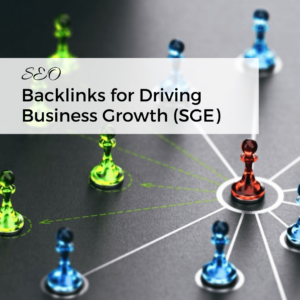Schedule a Free 360° Marketing Consultation
Ready to take your backlink strategy to the next level? Book your 360° Marketing Assessment today and let’s explore a tailor-made marketing strategy for your business.

You’re scaling your business, and you’ve got your eyes set on the prize. But let’s face it, the digital landscape is a battlefield, and you need every weapon in your arsenal to win. One such weapon, often overlooked but incredibly potent, is backlinks. Understanding the role of backlinks in SEO can be a game-changer for your business, even if you’re a solo entrepreneur or leading a small team.
Backlinks are not just digital nods from one website to another; they’re a strong indicator of your website’s authority and credibility. Google sees these links as endorsements, and the more quality endorsements you have, the higher you’ll rank.
What makes a backlink “good”? It’s not just about quantity; it’s about quality. A backlink from a reputable website with high domain authority is worth its weight in gold. Factors like relevance to your industry, the anchor text used, and whether the link is a “do-follow” or “no-follow” also play a crucial role.
The concept of link equity is another layer to this. Link equity is the SEO value a link passes from one page to another, and it’s influenced by factors like the linking page’s authority, topical relevance, and the number of links on that page. Understanding these nuances can significantly impact your SEO strategy.
Google’s algorithm is a complex beast, but one thing is clear: backlinks are a significant factor. They contribute to your domain authority, which is essentially a score that predicts how well your website will rank on search engine result pages (SERPs).
Real-world examples abound. Businesses have seen dramatic improvements in their rankings by focusing on building quality backlinks. It’s not just theory; it’s proven practice.
The world of backlinks is rife with misconceptions. One such myth is that “more is better.” While having a large number of backlinks can be beneficial, quality trumps quantity every time.
Black-hat SEO techniques like link farms can do more harm than good, leading to penalties from Google. Another misconception is that any backlink is a good backlink. Relevancy matters; a backlink from a website in your industry is far more valuable than one from a completely unrelated site.
You’re busy running your business, and SEO might seem like another item on an already long to-do list. But here’s the good news: building quality backlinks doesn’t have to be a full-time job, and there are strategic ways to go about it.
Guest posting is a tried-and-true method. It involves writing articles for other websites in your industry and including a backlink to your site. The key is to pitch to reputable websites that are relevant to your business.
Best practices include crafting a compelling pitch, writing high-quality content, and ensuring that your backlink appears naturally within the content. It’s a win-win: the host website gets quality content, and you get a valuable backlink.
Social media platforms like LinkedIn and Twitter can be goldmines for backlinks. By sharing valuable content and engaging with your audience, you can earn natural backlinks that boost your SEO.
Social signals, like shares and likes, also play a role in SEO, although they’re not direct ranking factors. Think of them as indirect endorsements that can still drive traffic and improve your online visibility.
If you’re a local business, directories like Yelp and Google My Business can be invaluable. These platforms offer a straightforward way to gain backlinks and are especially effective for local SEO.
Case studies have shown that businesses have climbed the SERPs ladder by focusing on local directories. It’s a low-hanging fruit that you shouldn’t ignore.
The SEO landscape is ever-changing, and with the advent of AI technologies, the rules of the game are set to evolve. While the full impact of AI on backlinks is still unfolding, experts from Google, Search Engine Journal, Neil Patel, and our own research into the hundreds of SEO clients we have worked with over the past couples of years, suggest that contextual relevance and user experience will gain even more prominence.
But let’s delve deeper into the seismic shifts happening in the SEO world, particularly with Google’s Search Generative Experience (SGE). According to a recent article by Mariya Delano on Search Engine Land, SGE is stirring up debates in the SEO community. The interface uses AI-generated summaries and has been criticized for potentially “stealing clicks” from original content creators. However, Google’s latest update aims to give more prominent attribution to source links, addressing some of these concerns.
“I’ve been very vocal since day one about the importance of Google incorporating links into SGE answers, just like Bing Chat has done from the start. I was excited (and relieved) today to see that Google took our concerns seriously and seems to be testing multiple layouts for incorporating links in SGE answers,” says Lily Ray, Senior Director, SEO and Head of Organic Research at Amsive Digital.
This development is crucial for anyone in the content creation and SEO space. It signifies a shift towards more transparent attribution, which could influence how backlinks contribute to SEO in an AI-driven landscape.
AI algorithms are getting better at understanding content in a nuanced way. This means that the quality of your backlinks will likely play an even more critical role in the future. It’s not just about the numbers; it’s about building a backlink profile that aligns with your overall business strategy and user intent.
“SGE feels like a natural development from previous SERP features,” says Danielle Stout Rohe, Sr. Data Program Manager, Content and SEO at Cox Automotive Inc.
So, what does this mean for you? As AI continues to evolve and search engines like Google adapt their algorithms, focusing on the quality and relevance of your backlinks will be more important than ever. It’s not just about gaming the system; it’s about providing real value that search engines can recognize and reward.
You wouldn’t run a marketing campaign without tracking its success, and the same goes for your backlink strategy. Monitoring and analyzing your backlinks can offer insights into what’s working and what needs improvement.
There are various tools available that can help you keep tabs on your backlinks. These tools offer features like tracking the number of backlinks you have, the domain authority of the linking sites, and whether the links are do-follow or no-follow.
Choosing the right tool depends on your needs and budget. Some popular options include SEMrush, Ahrefs, and Moz. Each offers a range of features that can cater to different business needs.
Key performance indicators (KPIs) like the number of new backlinks, the domain authority of the linking websites, and the relevance of the linking sites are crucial. These metrics can offer a snapshot of your backlink profile’s health.
Interpreting this data can guide your future backlinking efforts. For instance, if you notice that high-authority sites are linking to a particular piece of content, it might be worth creating more content around that topic.
A backlink audit is essentially a health check for your website’s backlink profile. Signs that you might need an audit include a sudden drop in website traffic, a decrease in rankings, or a manual action from Google.
Conducting a backlink audit involves using tools to gather data on your existing backlinks and then analyzing this data to identify any problematic links. Once identified, these links can either be removed or disavowed.
When it comes to backlinks and SEO, you don’t have to go it alone. At Vicky Wu Marketing, we bring 30 years of CMO-level experience to the table, offering bespoke and holistic strategies tailored to your unique needs. We’ve worked with tens of thousands of entrepreneurs to clear away the clutter and focus on what’s proven to work. Our Beyond-the-Graph Growth™ strategy ensures that your business is set up for both immediate and long-term success.
For a deeper understanding of backlinks and SEO, consider these resources:
A backlink is a link from one website to another. In the context of SEO, backlinks from reputable websites can significantly boost your site’s authority and ranking on search engine result pages (SERPs).
Quality backlinks can be obtained through various strategies like guest posting, leveraging social media, and local SEO. The key is to focus on reputable websites that are relevant to your industry.
Link equity is the SEO value that a link passes from one page to another. It’s influenced by factors like the linking page’s authority, topical relevance, and the number of links on that page.
While the full impact is still unfolding, AI technologies are expected to place more emphasis on contextual relevance and user experience, making the quality of backlinks even more critical.
A backlink audit is a health check for your website’s backlink profile. You should consider an audit if you experience a sudden drop in website traffic, a decrease in rankings, or receive a manual action from Google.
Schedule a Free 360° Marketing Consultation
Ready to take your backlink strategy to the next level? Book your 360° Marketing Assessment today and let’s explore a tailor-made marketing strategy for your business.

Vicky is the CEO and Chief Creative Strategist of Vicky Wu Marketing. She draws from 30 years of experience at the CMO level, the CEO level, marketing for Fortune 500 companies and multi-million and multi-billion-dollar organizations, PLUS strategies learned helping startups and nonprofits with limited budgets … now focusing on providing SMBs with effective and efficient marketing strategies – giving them access to the same level of expertise as the really big guys with deep pockets, that they may not otherwise be able to access.
Curious how you can increase your website traffic?
Get solid marketing strategies, designed for entrepreneurs on the track to 7-figures and beyond, right in your inbox.

